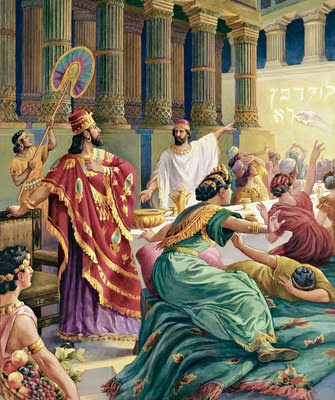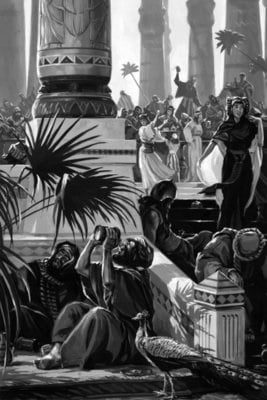2 February 2019 | Senate Chaplain and Adventist pastor Barry Black has been credited with bringing some civility to the impeachment trial of President Donald Trump. In a New York Times article originally from the Associated Press, titled “Senate Chaplain’s Velvet Voice Cuts Through Impeachment Fray,” Black is clearly identified as Adventist and as a […] Source: https://atoday.org/new-york-times-describes-barry-blacks-calming-influence-on-impeachment-trial/
Monday: An Uninvited Guest
Read Daniel 5:5-8. What happens, and why does the king respond as he does? In what ways does this account parallel Daniel chapter 2, and why is that parallel important? (See Ps. 96:5, Col. 1:15-17).
As Nebuchadnezzar does in previous crises (Dan. 2:2, Dan. 4:7), Belshazzar calls the astrologers, the Chaldeans, and the soothsayers to clarify the mysterious writing.
And to make sure that they give their best, the king promises them extravagant honors: (1) purple clothing, a color worn by royalty in ancient times (Esther 8:15); (2) a chain of gold, which was a sign of high social status (Gen. 41:42); and (3) the position of third ruler in the kingdom. This last reward reflects accurately the historical circumstances of Babylon at that time. Because Belshazzar was second ruler as co-regent with his father, Nabonidus, he offers the position of third ruler. But despite the tempting rewards, the sages once again fail to provide an explanation.
On top of all his sins, then, the king attempts to find wisdom in the wrong place. The Babylonian experts cannot uncover the meaning of the message. It is written in their own language, Aramaic, as we shall see tomorrow, but they cannot make sense of the words. This might remind us of what the Lord speaks through Isaiah: “For the wisdom of their wise men shall perish, and the understanding of their prudent men shall be hidden” (Isa. 29:14, NKJV). After quoting this verse the apostle Paul states: “Where is the wise? Where is the scribe? Where is the disputer of this age? Has not God made foolish the wisdom of this world? For since, in the wisdom of God, the world through wisdom did not know God, it pleased God through the foolishness of the message preached to save those who believe” (1 Cor. 1:20-21, NKJV).
Some truths are too important to be left for humans to try to figure out for themselves. That’s why God, instead, reveals these truths to us.
| Think about what the rewards were going to be, and given what was to soon follow, how worthless those rewards really were. What should this tell us about just how fleeting things in the world can be, and why we always need to keep the perspective of eternity in mind in all that we do? |
 (1)
(1)1 John 4:8
Whoever does not love does not know God, because God is love.
http://feedproxy.google.com/~s/dailybible/main/?i=http://dailybiblepromise.com/verse/2020/02/02
![]() Source: http://feedproxy.google.com/~r/dailybible/main/~3/NGkvSLL1x2g/02
Source: http://feedproxy.google.com/~r/dailybible/main/~3/NGkvSLL1x2g/02
Sunday: Belshazzar’s Feast
Read Daniel 5:1-4 along with Daniel 1:1-2. What is Belshazzar doing that is so bad? How does it reveal his true character? Compare his actions with Revelation 17:4-6. What parallels can you find?
The king commands that the sacred utensils of the Jerusalem temple be used as drinking vessels. Nebuchadnezzar seizes the vessels from the Jerusalem temple, but he places them in the house of his god, which shows that at least he respects their sacred status.
But Belshazzar turns the sacred vessels into drinking utensils in a most profane way.
While drinking from the sacred vessels, Belshazzar’s lords “praised the gods of gold and silver, bronze and iron, wood and stone” (Dan. 5:4, NKJV). It is worth noticing that six materials are mentioned. The Babylonians used the sexagesimal system (a system based on the number 60) in contrast to the decimal system used today (based on the number 10). Thus, the six categories of gods represent the totality of the Babylonian deities and, therefore, the fullness of the Babylonian religious system. Interestingly enough, the order of the materials follows the order of the components of the dream statue of Nebuchadnezzar, except that wood replaces the clay. As in the dream, stone appears last; although here it designates the material composition of idols, stone also evokes God’s judgment upon worldly empires (see Dan. 2:44-45), which Babylon symbolizes.
This feast serves as an apt representation of end-time Babylon as seen in the book of Revelation. Like Belshazzar, the woman in end-time Babylon holds a golden cup and offers polluted drink to the nations. In other words, by means of false doctrines and a distorted worship system, modern Babylon lures the world into evil (Rev. 17:4-6), oblivious to the judgment that will soon fall upon her. One day judgment will come.
| What are ways in which our society and culture profane the truth of God’s Word? How can we be careful not to take part in that profanation, even in subtle ways? Bring your answer to class on Sabbath. |
 (1)
(1)







